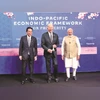A day after signing the supply chain pillar of the Indo-Pacific Economic Framework for Prosperity (IPEF), the 14 member countries on Thursday announced “substantial conclusion” of negotiations for two more pillars — clean economy and fair economy. Negotiations for the remaining pillar on trade, where India is not participating, remains inconclusive.
A joint statement released after the IPEF ministerial meeting in San Francisco said partner countries will now undertake the necessary steps, including further domestic consultations and a legal review, to prepare final texts of the three proposed agreements including the supply chain pillar. “Once finalised, the proposed agreements will be subject to IPEF partners’ domestic processes for signature, followed by ratification, acceptance, or approval,” it added.
Through the IPEF Clean Economy Agreement, the IPEF partners committed to actively pursue their shared climate objectives and respective pathways to net-zero emission economies, while also ensuring the promotion of sustainable growth and success for all partners. “To that end, the proposed agreement covers a range of issues critical to transitions to clean economies, including efforts towards energy security and transition, climate resilience and adaptation, greenhouse gas emissions mitigation, and the promotion of sustainable livelihoods and just transition,” the joint statement said.
Through the agreement, IPEF partners intend to accelerate research & development and deployment of a diverse set of clean energy and climate friendly technologies; reduce global anthropogenic methane emissions by 2030, particularly through cost-effective measures in the energy sector; decarbonise and reduce the climate impact of the transportation sector; advance sustainable agricultural practices to reduce emissions, increase productivity, and adapt to the impacts of climate change; cooperate with partners in the development of and engagement with carbon markets by working together on issues such as carbon credit certification standards, among others.
The IPEF partners also seek to increase investment flows to the region to address the acute need for financing for climate-related infrastructure, technologies, and projects in support of their transitions to clean economies. To that end, the proposed agreement includes commitments to mobilise and expand access to financing, including by deploying concessional capital, pursuing blended financing structures, guarantees and risk insurance, and technical assistance, developing the pipeline of bankable climate projects, and forming public-private partnerships.
As part of these efforts, the IPEF partners will convene an annual IPEF Clean Economy Investor Forum, with the first meeting taking place in Singapore in the first half of 2024, to catalyse investment for sustainable infrastructure and climate technology. The IPEF partners also established the IPEF Catalytic Capital Fund administered by the Private Infrastructure Development Group to expand the pipeline of bankable climate-related infrastructure projects.
Under the IPEF Fair Economy Agreement, the IPEF partners committed to working together to enhance transparency, the rule of law, and accountability in their economies to improve the trade and investment environment in the Indo-Pacific region. “The IPEF partners further recognise that a more transparent and predictable business environment can spur greater trade and investment in their markets and level the playing field for businesses and workers in the economies of the IPEF partners,” the joint statement said.
More From This Section
To achieve these goals, under the proposed agreement, the IPEF partners would work together to enhance their efforts to prevent and combat corruption including bribery, and support efforts to improve tax transparency and the exchange of information, domestic resource mobilisation, and tax administration.
Under the proposed agreement, the IPEF partners also would establish a new Capacity Building Framework (CBF) to enhance each other’s capabilities to effectively implement all aspects of the proposed agreement. The IPEF partners would also hold annual coordination meetings on anti-corruption, labour, and tax to discuss implementation of commitments, challenges in implementation, and any technical assistance needs.

)
